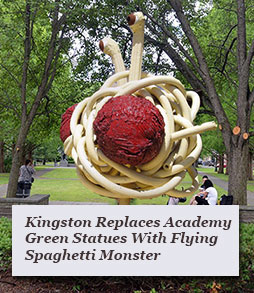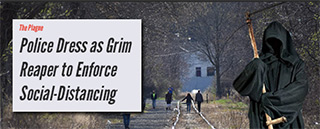
KINGSTON- Over 300 years ago, a wall was erected surrounding what is now Uptown Kingston to protect the Dutch settlement from armed raids. This week, a group of residents stood up a wall once again to keep out invaders of another kind: tourists, in particular those from the New York City area, the largest COVID-19 hotspot in the nation.
“Normally, the first few warm spring weekends cause an influx of visitors from Brooklyn,” said resident Pedro Stuyvesant. “We expected that would only be exacerbated by the virus this year.”
Local civic and business leaders say they were alarmed by the large amount of visitors from outside the county to area parks and communities in recent weeks. After their calls to prevent travel from the NYC metro area went unheeded, they decided to take matters into their own hands.
“The Italian city of Ferrara managed to avoid a single plague death in the late 16th century, while other cities lost 1/3 of their population,” said resident and businessowner Kristin Wiltwyck. “The difference? Ferrara had a wall.”
All residents of the Stockade are tested for COVID-19 every 10 days and required to self-isolate if positive. As a result, the virus has been all but wiped out and local businesses have re-opened. As the neighborhood is car-free, local restaurants have taken advantage of the warming weather to expand outdoor seating into the deserted streets, with fresh air further inhibiting potential spread of the virus.
The Stockade has already faced attempted incursions. Recently, several irate tourists claiming to have Airbnb reservations for a property within the walls demanded entry. After refusing to depart, guards manning the garrison at the North Gate dumped scalding oil from the ramparts down upon them, drew and quartered them using teams of goats, then mounted their heads on spikes at the Thruway Exit 19 tollbooths.
The owner of the Airbnb got off comparatively lightly: He was placed in the Senate House stocks and pelted with fresh local produce from the Kingston Farmers Market for three days and three nights.
Further plans call for converting spans over the Esopus, Rondout and Hudson into draw bridges, and stocking the waters with alligators and piranhas.
“I’m hesitant to say it,” said sentry Lenore Ten Broeck, looking out on a park scene where students were receiving in-person instruction under an oak tree, young lovers were canoodling, gainfully employed restaurant servers were busily delivering food and drinks to picnicking diners, and grandparents, parents and children freely mingled, hugged, and experienced the vital human need to be touched. “But walls work.”




